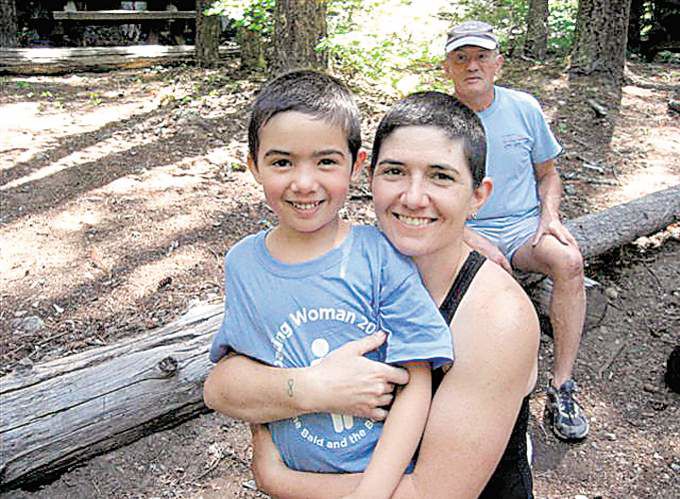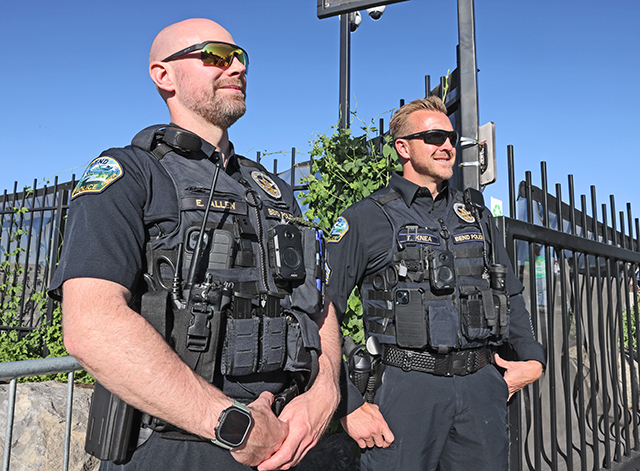Aunt and uncle roles go beyond standard definitions
Published 5:00 am Friday, September 12, 2008

- Phoenix Benedetti, 6, and her aunt Reagen Benedetti shaved their heads this summer to show support for Phoenixs grandmother, who is battling breast cancer. Phoenix has a special relationship with her aunt. I want to see her, like, a lot of days, she says. I like her a lot.
In an ideal world, aunts and uncles are part mentor, part buddy, part sounding board and part baby sitter, with a role that’s somewhere between a parent and a friend.
Kids can benefit from these close bonds.
“Research has shown that a support system is one of the most important and crucial things for kids,” said child psychologist Robin Goodman. “The wider the network is, the better.”
Bend residents Kyle and Heidi Weaver spend several days each week with their niece Morgan, 6, and nephew Nathan, 3. The Weavers, both 34, have always valued family. While other young couples move to Bend for the outdoors and weather, the Weavers moved to Central Oregon to be near family.
“They are the closest thing we have to kids right now,” said Kyle Weaver. “We each feel a need for each other.”
The Weavers
Kyle and his sister Kecia Weaver have always been close. So, when Kyle and Heidi wanted to move away from Los Angeles, it was easy for Kecia to convince them to move near her in Bend, in 2001. Not long after, they welcomed their niece into the world.
Kyle and Heidi try to follow all the rules Kecia puts in place. They know which TV shows the kids can watch and what behavior warrants discipline. But they also want to make their house a fun place where Morgan and Nathan want to go.
The kids have become such a huge part of their lives that Heidi says it’s weird when she goes more than a few days without seeing them.
They even save old voice mails from Morgan and Nathan, going back to the time they could barely talk. Kyle and Heidi say when they are feeling down, they listen to one of the messages.
“You hear the chirpy voices; it brightens your day,” said Kyle.
Morgan recently called them to report on her first day of school (it was “awesome”), and that kind of connection makes Heidi and Kyle feel really lucky.
“We’re very, very blessed to be able to be part of their lives since they were born,” said Kyle.
Heidi and Kyle want to have a baby of their own, but it hasn’t been easy for the couple. Kyle says they’ve had a few heartbreaks on the road to forming a family. For now, they feel grateful for the children who are in their lives.
“Having them kind of fills that hole a little bit,” said Heidi.
They also feel being such an integral part of Morgan and Nathan’s lives is good training for when they do have a baby. They know what it is like to change diapers and potty train a toddler.
“It does give you a more realistic picture,” said Kyle.
When Mo and Nate (as Kyle and Heidi call them) visit their aunt and uncle, they like to watch movies (“Star Wars” is a favorite), play in the backyard and go for picnics or maybe a visit to Sun Mountain Fun Center. They engage in horseplay, and the kids have been known to get rides on their uncle’s back, as if he were a camel. Kyle and Heidi are regulars at Morgan’s dance recitals and sporting events. Heidi even went to Morgan’s “Mommy and Me” class at school when Kecia couldn’t attend.
Kyle and Heidi hope they can be role models and provide a safe zone for the kids. The relationship also means a lot to Kecia. She thinks Heidi and Kyle help reinforce family values and offer a treat for the kids.
“They are a priceless gift for me and my kids,” said Kecia. “I just think it’s something that we absolutely benefit from. You can’t buy that love and security, even from the best baby sitter.”
Morgan says she looks forward to coming over to her “auntie and unkie’s” house (as she calls it), even if their backyard isn’t as big as the one she has at home. She likes getting to ride on Kyle’s back, going shopping with Heidi and just hanging out.
“They’re really nice. They’re the greatest auntie and uncle in the whole world,” said Morgan.
“I would say the same thing,” said Nathan.
Shift in demographics
When New York aunt Melanie Notkin started looking for resources specifically aimed at aunts, she couldn’t find very much.
Every Web site she visited focused on moms and parents, and Notkin began to wonder, “What about us? We almost need resources even more.”
“Unfortunately, no one has really looked at this segment (of the population). The whole world has been focused on mom,” said Notkin. “It used to be that mom equaled woman. The landscape has changed.”
So, she decided to create the new Web site Savvy Auntie, www.savvyauntie.com, which includes a wealth of features for biological aunts and aunts by choice.
She says this resource is needed now more than in years past, because more and more women fall into the childless aunt category, as many are waiting longer to have children and a growing percentage are forgoing kids altogether.
About 20 percent of women ages 40-44 are childless, more than twice the rate of 30 years ago, according to a new report, “Fertility of American Women,” from the U.S. Census. But just because women don’t have children doesn’t mean they are single, and it doesn’t mean they don’t love kids, according to Notkin. She created a term for this: PANK, or Professional Aunt, No Kids.
Notkin believes many aunts want to spend their discretionary income and time on their nieces and nephews in part to “fulfill and nurture our own maternal instincts.” The site focuses on aunts rather than uncles, so women can feel comfortable sharing more personal stories about fertility issues.
Gift guides are a big part of the site, because PANKs “don’t necessarily know what kids are into.”
Clinical and school psychologist Gloria Rothenberg, of New York, believes aunts and uncles without children can be just as helpful and just as involved as those with children of their own.
“Each person has a different facet they can share,” she said.
For years, Redmond resident Ina Moser was an aunt with no children of her own. She formed a close connection with her niece and nephew, Kristen and Alex, now 12 and 13. She always tries to go to their sporting events because she knows how nice it is to look into the crowd and see a large group of family members out there supporting you.
As an aunt, Moser learned about the ups and downs of being a parent from her sister, Karen Wales. It showed her how even good kids could bring about a bad day.
“It kind of prepared me to know it would not be this dream,” she said.
Now she has her own daughter, Madalyn, 2. Moser sees her sister and their family at least once a week, and she sees this connection as really valuable.
“It teaches them how to build relationships and how important family is,” she said.
Moser learned about what kind of father her husband, Chuck, would become by watching him interact with his niece, who was just 3 or 4 when Moser and Chuck first met. He told her he wasn’t really a kid person and always seemed standoffish when children were around. But he loved reading to and spending time with his niece. He liked to spoil her with attention.
Now, he acts the same way around Madalyn. He also feels closer to his niece and nephew and makes special time for them. He takes his nephew to the speedway races, and they call him “cool Uncle Chuck.”
“I love that,” said Moser.
She thinks having a close bond with her niece and nephew, and in turn having her daughter form a close bond with her sister, is good for the whole family.
“Kids don’t always want to share things with parents. It gives them more of a support group,” said Moser.
Potential benefits
“Aunts and uncles can bring new experiences, new information and expose a child to a broader world,” said Rothenberg.
They may eat different food, watch different movies, share different conventions, talk about different subjects or have different rules. All of these changes open a child up to the world of possibilities.
Aunts or uncles can introduce kids to new hobbies, such as scrapbooking, baking, sports or hiking.
Bonding with aunts and uncles can also help kids see their parents in a new light.
“Kids have a lot of trouble seeing their parents as anything but parents,” said Rothenberg.
But thanks to aunts and uncles, kids also get to see them as brothers and sisters. “They get to see their parents as human,” said Loren Gelberg-Goff, a licensed clinical social worker.
She also sees the benefits of kids having “other people in their lives who can love them unconditionally.”
Annette Benedetti was a single mom to a baby girl when she moved into her sister Reagen’s large house in Seattle. Reagen Benedetti and her life partner Emily Hutchins essentially helped Benedetti raise her daughter Phoenix for the first few years of the little girl’s life. Reagen and Emily would pick Phoenix up from day care and care for the baby when Annette could not. Though Annette later married and moved to Bend, she and her sister remain close. And the strong connection formed between Reagen and Phoenix, now 6, still holds.
Phoenix and Reagen share many traits, including warmth, a silly sense of humor, bravery and a sense of adventure.
“They have the same souls,” said Benedetti.
She likes that her daughters Phoenix, 6, and Rain, 3, can look up to her sister, who is a firefighter. Benedetti sees Reagen and Emily as good role models who “work to make their community better.”
And she appreciates the diversity her children were exposed to through Reagen and her partner Emily. “They will grow up without biases,” said Benedetti. “They gave them this gift of acceptance and nonjudgment.”
Phoenix still talks about Reagen and Emily frequently. She likes it when Reagen takes her to visit the science museum in Seattle and when they make dinner together. She would like to see her aunt a lot more than she does now.
“I want to see her, like, a lot of days,” said Phoenix. “I like her a lot. She’s excited and she does lots of fun stuff together with me.”
Unique relationships
Aunts and uncles don’t have to be related to children to provide benefits to little ones. Close friends can serve as aunts or uncles and offer many of the same benefits as biological relatives. Goodman says these surrogate aunts and uncles can play just as important a role as biological ones.
Aunts and uncles become even more important to families in certain stressful situations, according to Goodman. When parents divorce, a parent dies or the family experiences some kind of trauma, aunts and uncles’ relationships with kids can become even more critical. Sometimes children feel more comfortable talking with aunts or uncles about a particular problem or issue than with their parents, especially if the issue involves the parents.
“They have a very special role,” said Goodman.
In particular, she points to teenagers, who she says struggle for independence but still look for guidance. Aunts and uncles can help bridge that gap.
Parents play an important role in creating and maintaining the relationship between kids and their aunts and uncles.
“Parents themselves have to appreciate, honor, respect and encourage it,” said Goodman.
Many aunts and uncles aren’t able to share the day-to-day lives of their nieces and nephews because of geography. This can alter the kind of relationship they are able to develop.
Rothenberg says proximity is a huge factor. “It makes a very big difference,” she said.
For instance, kids won’t necessarily call and reach out to aunts or uncles with a problem if they live a long distance away, she said.
“I don’t think they can have the same kind of connection” as relatives who live nearby, Rothenberg said.
Gelberg-Goff, however, thinks distance can sometimes make the relationship a bit easier. Aunts and uncles can stay connected to kids through e-mail and cell phones, while avoiding the day-to-day struggles.
“It’s easier sometimes to love from afar,” she said.
Living close together can create disappointment and more expectations.
“It’s the quality and energy one brings to the relationship that makes the difference,” said Gelberg-Goff.
The key is for aunts and uncles to consider what kind of relationship they want to have with nieces and nephews and then think about what they are willing to do to create it.






